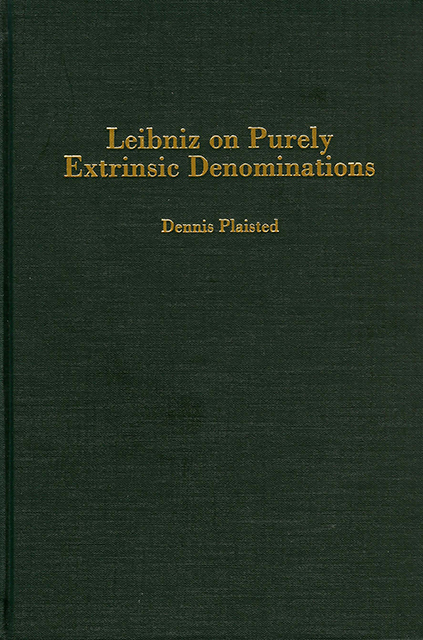Book contents
- Frontmatter
- Dedication
- Contents
- Acknowledgments
- Introduction
- Chapter One Two Views of Purely Extrinsic Denominations
- Chapter Two Truth and Purely Extrinsic Denominations
- Chapter Three Extrinsic Denominations and Where Accidents Are Allowed to Put Their Feet
- Chapter Four Extrinsic Denominations and the Interconnection of All Things
- Chapter Five Extrinsic Denominations and the Foundations of Relations
- Chapter Six Extrinsic Denominations and the Claim that Every Monad Expresses the Universe
- Appendix A Critique of Massimo Mugnai’s Version of NPE
- References
- Abbreviations
- Notes
- Index
Chapter Five - Extrinsic Denominations and the Foundations of Relations
Published online by Cambridge University Press: 25 March 2023
- Frontmatter
- Dedication
- Contents
- Acknowledgments
- Introduction
- Chapter One Two Views of Purely Extrinsic Denominations
- Chapter Two Truth and Purely Extrinsic Denominations
- Chapter Three Extrinsic Denominations and Where Accidents Are Allowed to Put Their Feet
- Chapter Four Extrinsic Denominations and the Interconnection of All Things
- Chapter Five Extrinsic Denominations and the Foundations of Relations
- Chapter Six Extrinsic Denominations and the Claim that Every Monad Expresses the Universe
- Appendix A Critique of Massimo Mugnai’s Version of NPE
- References
- Abbreviations
- Notes
- Index
Summary
I. Introduction
This chapter has two aims. The first is to provide a textually responsible, nonreductionist account of Leibniz’s claim that extrinsic denominations are founded on intrinsic denominations. The second is to explain the connection of NPE to this claim. With regard to the first aim, I argue that when Leibniz asserts that extrinsic denominations are founded on intrinsic ones, the surrounding context nearly always makes clear that he is merely asserting that relations simpliciter are founded on intrinsic denominations. I further argue that the intrinsic denominations upon which relations simpliciter are founded are actually relational accidents. This, of course, requires a showing that relational accidents can be plausibly regarded as intrinsic denominations. Leibniz frequently uses the term “extrinsic denomination” to refer to denominations that are extrinsic to or out of what they denominate, and relations simpliciter are extrinsic denominations in just this sense. In keeping with this, intrinsic denominations are those that are in or intrinsic to what they denominate, and as Leibniz considers relational accidents to be in things, they are intrinsic denominations in this sense. This showing points the way to an understanding of how NPE is related to the claim that extrinsic denominations are founded on intrinsic denominations. NPE, under my interpretation, is the claim that there are no extrinsic denominations (where “extrinsic denomination” is here understood as a relational accident) that are not in what they denominate. And so, because denominations that are in what they denominate are rightly counted as intrinsic denominations, NPE is basically the assertion that what are commonly considered extrinsic denominations are actually intrinsic denominations. Thus, NPE must be true for relations simpliciter to have their foundations in things. This is precisely the result Leibniz seeks to establish in his essay, On the Principle of Indiscernibles. Leibniz argues that because a thing’s position in space, which is a relation simpliciter, requires a foundation in things, NPE must be true. The central premise of this argument is the famous principle of the identity of indiscernibles. Hence, in this chapter, the opportunity of considering Leibniz’s third argument for NPE arises. As with the PS and IC arguments, the approach I take is that of comparative reconstruction. I argue that my reading of NPE is a far more plausible candidate for the conclusion of this argument than its reductionist counterpart.
- Type
- Chapter
- Information
- Leibniz on Purely Extrinsic Denominations , pp. 69 - 82Publisher: Boydell & BrewerPrint publication year: 2002



